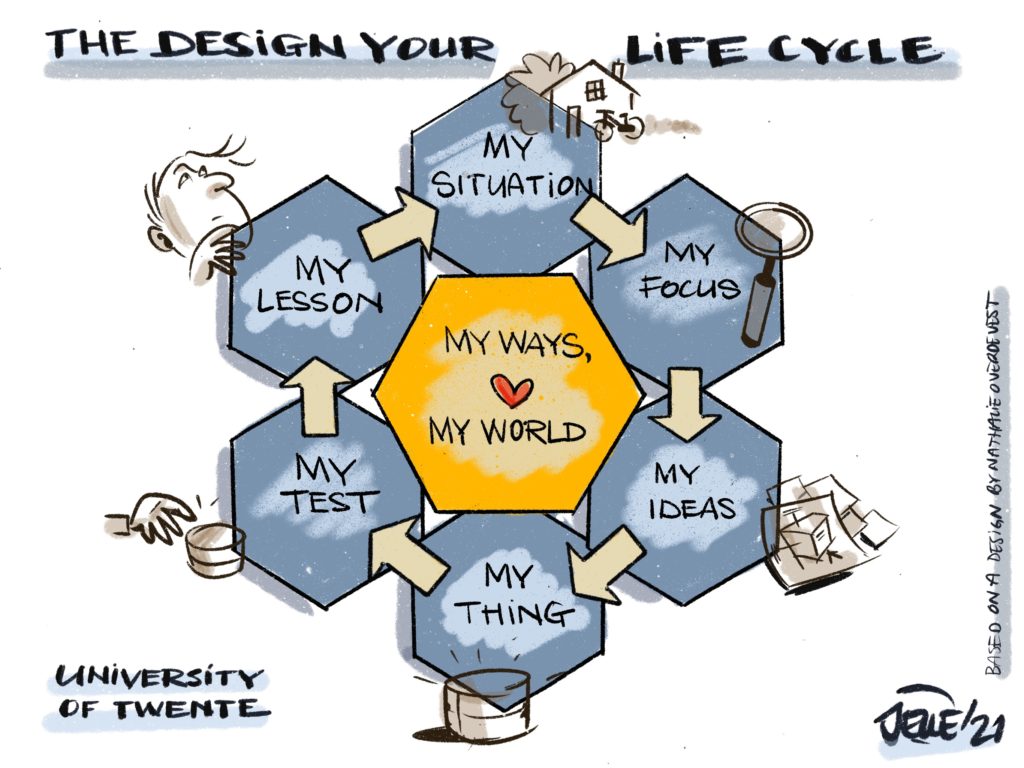About
‘Design Your Life’ – is a project funded by NWO and RAAK research grants and headed by Jelle van Dijk (University of Twente) and Maurice Magnee (Han University of Applied Sciences) in the Netherlands.
What do we mean with Design your Life
It is something we do on a regular basis. It is that one tool you’ve created for yourself that makes your life easier, that one strategy that makes that horrid chore an easy or even fun job instead. These are tools that make your life easier, more enjoyable or less stressful. Within the Design Your Life research project, we are creating a toolkit for young autistic adults with which they can create their own, personalized solutions. Making your own thing, that works just for you, in the way you want it to do is, we believe, a very positive force for increasing your sense of autonomy.
The autistic experience
In this project we foreground what it is like to be autistic, not as a problem, but as a way of being that differs from the average person. The toolkit takes as a starting point how an autistic person experiences the world and how the one can develop personal solutions to deal with the various demands of day-to-day life.
These demands are especially important in the life of an autistic person growing into adulthood. Like all people, autistic people go through many changes in life, such as puberty, finishing education, starting a job and becoming more independent. But the pace at which they do so may be slower and the hurdles to overcome more challenging, especially when an existing network of support breaks down and new stable configurations need to be found.
These changes are accompanied by increasing demands on the young autistic adult. This can lead to them needing new strategies to support their growing independence. This is where the Design Your Life-toolkit comes in.
Co-design
This toolkit has co-design at its core: it is developed to support a co-design process, but it is also being developed through co-design. We use co-design to give the young autistic adult the tools to express themselves and advocate for their needs.
The toolkit offers the participants an iterative design cycle that is derived from the Stanford d.school Design Thinking method (Doorley et al., 2018), guiding them through the following stages:
- My situation (‘Mijn situatie’): during this phase the participant investigates which technologies they already use and what their opinion of that technology is.
- My focus (‘Mijn focus’): the participant determines what they are designing their technology for.
- My ideas (‘Mijn ideeën’): the participant generates ideas to create their ideal technology.
- My thing (‘Mijn ding’): the participant picks one idea and creates a prototype.
- My test (‘Mijn test’): the participant tests the prototype.
- My lesson (‘Mijn inzicht’): the participant draws insights from testing their prototype and their design process. This step offers input for a second design cycle.
- On the long run: As you go through the Design your Life cycle multiple times, you gradually develop your own ‘ways’ for living your own life, which fit your neurodiversity, and you develop at the same time, step by step, your own lifeworld, that is to say: your own everyday environment, with the things, tools, technologies and spatial arrangements that fit you best!

You can conduct the Design your Life process alone, but it works better to work with a trusted co-design partner. This partner is preferably someone who knows you well and can support you during the design process.
Research through design
The project uses a research-through-design approach: during several design cases different forms of the toolkit are being tested with a young autistic adult and their co-design partner. The insights from these cases are then used to create a new iteration of the toolkit. More about the research background of our method can be found on our Research Page
Timeline
The Design Your Life project ran between February 2020 and the end of 2024. Currently, we are interested in bringing our methods and tools to the everyday practices of autistic young adults, their families and trusted others, care-givers, coaches, and health care organisations. If you are interested in collaborating with us please search for Jelle van Dijk at University of Twente online and contact him by email.